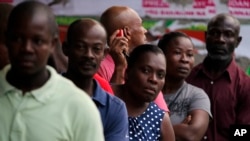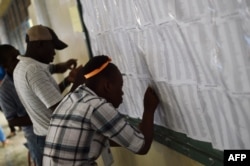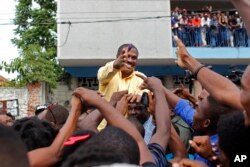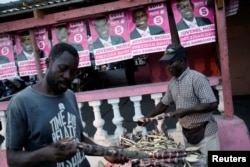Vote counting has begun in Haiti's repeatedly derailed presidential election. The vote went off relatively smoothly Sunday after an annulled election in October and Hurricane Matthew’s serious damage in the Caribbean nation last month.
No official results were expected to be issued for eight days, and Provisional Electoral Council executive director Uder Antoine has said it might take longer than that.
Six million Haitians were eligible to vote for one of 27 presidential candidates, as well as for members of both houses of parliament.
According to reports, voters patiently waited for their turn at the many polling stations throughout the island.
“I will wait as long as I need to,” Alain Joseph, a motorcycle taxi driver and father of four, told the Associated Press.
Haitians are hoping the new national leader will end a year of uncertainty and struggles, while uniting the nation and creating jobs. Many Haitians still suffer from a 2010 earthquake and its most recent serious storm, Hurricane Matthew.
There is no clear-cut leader among the 27 candidates for president.
The candidates included: Jovenel Moise, a plantation owner, chosen by the ruling PHTK ("the Bald Heads Party") and former President Michel Martelly; Jude Celestin of the LAPEH Party, who was runner-up in the 2015 ballot that subsequently was canceled; and Maryse Narcisse, one of two women on the ballot, who was a spokeswoman for former President Jean-Bertrand Aristide. He endorsed Narcisse and encouraged his supporters to take to the streets in protest if her candidacy failed.
"We are in political crisis. We need an elected government to get out of this situation," 19-year-old and first time voter Launes Delmazin said.
A recent survey by pollster BRIDES showed Moise the most likely candidate to be elected to hold the country's highest office. The result, however, could be different as reports say national surveys in Haiti are not reliable.
Long before the hurricane hit, political turmoil had delayed Haiti's vote. A presidential election was held in October 2015, but the results were scrapped because of fraud. Violent protests disrupted parliamentary elections earlier last year, and results were canceled in about a quarter of the districts.
All of those offices are due to be decided after Sunday’s votes are counted, although runoff votes will be necessary in many cases.
More than 13,000 police officers and United Nations peacekeeper troops are on the streets to safeguard voting centers.
But with so many candidates for president, no one is likely to gain an absolute majority of the vote, or reach a 25 percent plurality over the second-ranking candidate.
The top two finishers Sunday will face off January 29, with the winner to be sworn into office for a five-year term eight days later.
Jocelerme Privert, chosen to be Haiti's interim president in February, has remained in power even though his mandate expired five months ago. He is expected to remain in charge of the government until the next president is chosen.
In an address to the nation this week, Privert called on all Haitians to take part in the elections even though conditions are difficult in many areas.







